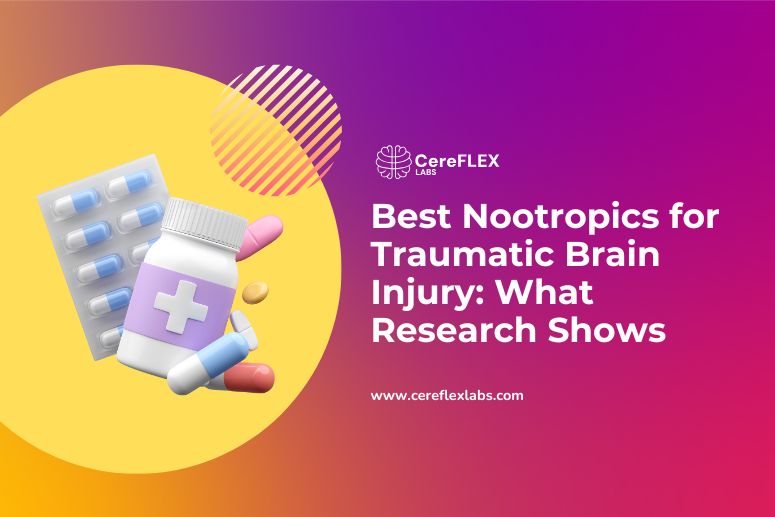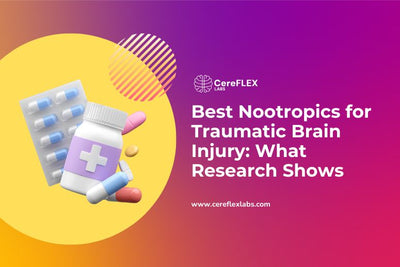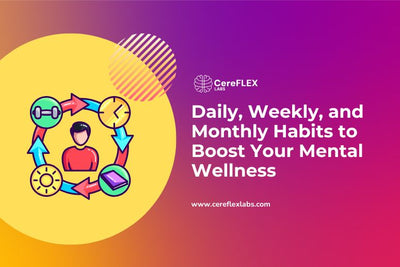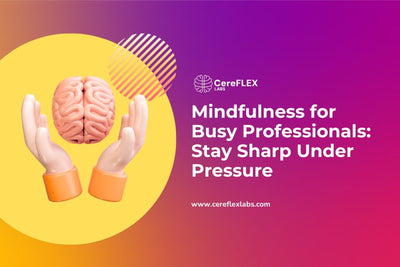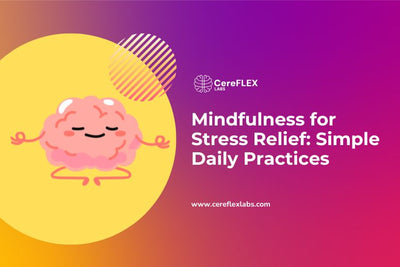A traumatic brain injury (TBI) can affect memory, focus, mood, and information processing. These changes often last well beyond the initial impact.
Recovery usually involves medical care, therapy, and lifestyle adjustments. Researchers are also studying whether certain nootropics (sometimes called “cognitive support compounds”) could play a role in supporting brain wellness during this process.
These range from familiar nutrients like omega-3 fatty acids and B-vitamins to investigational compounds tested in controlled studies. Early findings suggest some may help protect brain cells, support circulation, or influence pathways tied to memory and focus.
While research is still developing, many people are curious about how safe, accessible supplements might complement a broader recovery plan.
This guide reviews the most studied and emerging nootropics for TBI, what the science currently says, key safety considerations, and how to make informed decisions with professional guidance.
Here is the Quick Answer |
|
Several nootropics are being studied for traumatic brain injury (TBI) recovery. Evidence suggests omega-3 fatty acids, citicoline, creatine, phosphatidylserine, L-theanine, curcumin, magnesium, vitamin B12, and prescription agents like Cerebrolysin or methylene blue may support memory, neuroprotection, or brain repair. Results remain preliminary, and medical guidance is essential before adding any compound to a recovery plan. |
What are nootropics?

Nootropics, sometimes called “cognitive enhancers,” are compounds that may influence mental performance. They are often studied for potential effects on areas like memory, focus, mood, and overall brain function.
The term was first introduced in the 1970s by Dr. Corneliu Giurgea. He described nootropics as substances that should support learning and memory, protect the brain against injury, and have a low risk of side effects.
How They Differ from General Supplements
While all nootropics can be grouped under supplements, not every supplement is a nootropic.
- General supplements usually aim to correct deficiencies or support broad health (e.g., vitamin D for low levels, iron for anemia).
- Nootropics are specifically selected for their potential influence on cognitive processes or neurological health.
Some may act by supporting blood flow to the brain, reducing oxidative stress, or balancing neurotransmitters. Others are investigated for their role in recovery after neurological injury.
In short: while a daily multivitamin supports overall health, a nootropic is chosen for its possible direct effect on brain performance or recovery.
Categories of Nootropics
Nootropics are generally divided into two broad groups:
- Natural nootropics – Compounds from plants, foods, or naturally occurring in the body. Examples include omega-3 fatty acids, creatine, L-theanine, and bacopa monnieri.
- Synthetic nootropics – Man-made compounds developed to influence cognition. Examples include piracetam, phenylpiracetam, and modafinil. Some are researched for medical use, but many are not approved everywhere.
Why Consider Nootropics for TBI Recovery?

Recovering from a traumatic brain injury is rarely straightforward. Standard medical care, rehabilitation, and lifestyle adjustments remain the foundation of treatment. At the same time, researchers are examining whether certain nootropics might provide added support during recovery.
Neurological Effects of TBI
A brain injury does more than cause the initial impact. In the hours and days that follow, the brain may also experience:
- Inflammation
- Oxidative stress
- Reduced blood flow
- Loss of vulnerable neurons
These changes can affect memory, focus, mood, and overall cognitive function long after the injury.
For a broader perspective on recovery, see our guide on post-TBI brain healing strategies, which covers lifestyle, nutrition, and supportive approaches that complement medical care.
Potential Areas of Support
Early research suggests some nootropics may help address these challenges. Depending on the compound, they are being studied for their ability to:
- Provide neuroprotection – shielding brain cells from oxidative or inflammatory damage
- Support repair processes – aiding the growth and reconnection of neurons
- Improve blood flow – helping oxygen and nutrients reach the brain
- Balance neurotransmitters – influencing brain chemicals linked to memory, mood, and focus
For example, omega-3 fatty acids are being studied for their anti-inflammatory properties, citicoline for its role in cell membrane support, and methylene blue for possible effects on mitochondrial function.
Importance of Medical Supervision
Even when nootropics are available over the counter, self-prescribing is risky. Natural compounds can still interact with prescription medications or worsen certain health conditions. Some nootropics also fall into prescription-only or experimental categories.
That’s why medical supervision is essential. A healthcare professional can help assess whether a particular option is safe, appropriate, and legally permitted in your area.
Evidence-Based Nootropics for TBI
Research into nootropics for traumatic brain injury is still developing. Some compounds have shown encouraging results in early studies and animal models. Below are several that are most often discussed in the scientific literature.
Omega-3 Fatty Acids

Omega-3 fatty acids, commonly found in fish oil, are being studied for their potential to support recovery after TBI.
Animal studies suggest they may reduce oxidative stress and inflammation, while also helping with brain cell survival and repair processes.
In some models, repeated omega-3 supplementation was linked to better cognitive outcomes. However, more human research is needed to confirm these effects.1 2
Citicoline
Citicoline (CDP-choline) is a compound naturally involved in brain cell function. Research indicates it may help stabilize cell membranes, support neurotransmitter activity, and reduce secondary brain damage after TBI.
Some clinical studies suggest citicoline could aid recovery of consciousness and overall outcomes, though findings are not yet consistent across all trials.3
Creatine
Creatine supports energy metabolism in cells and has been studied as a potential aid in TBI recovery. Evidence suggests it may reduce neuronal damage and protect against energy loss in brain tissue. Animal and broader TBI research shows promise, but direct studies in mild TBI remain limited.4
Methylene Blue
Methylene blue is being researched for its antioxidant and mitochondrial support properties. In animal models of TBI, it has been linked to smaller lesion sizes and better motor recovery. Some of its existing medical approvals could support future clinical research, but its role in TBI treatment remains experimental.⁵
Phosphatidylserine (PS)
Phosphatidylserine is a key component of brain cell membranes. After TBI, levels often drop, which can affect cell stability and communication.
In animal studies, supplementation with PS and related compounds has been linked to improved cognition, reduced inflammation, and support for synaptic repair. More research in humans is still needed.6
L-theanine

L-theanine, an amino acid from green tea, is being studied for its calming and neuroprotective effects.
In preclinical models of TBI, it reduced neuronal death, zinc buildup, and inflammation, while improving learning and memory performance. These results are promising but not yet confirmed in clinical trials.7
Magnesium
TBI can lower magnesium levels in both the brain and blood.
Animal research shows supplementation may reduce damage and aid recovery. Human results are mixed, partly because it is difficult to raise brain magnesium through standard supplementation. Studies suggest pairing magnesium with other treatments may enhance its effects, but more trials are needed.8
Curcumin

Curcumin, the active compound in turmeric, has strong antioxidant and anti-inflammatory properties. Preclinical studies suggest it may help regulate pathways involved in TBI damage and support cell survival. While animal research is encouraging, poor absorption in humans limits its effectiveness without specialized formulations.9
Cerebrolysin
Cerebrolysin is a peptide-based therapy that has been studied in patients with severe TBI.
In some trials, patients receiving Cerebrolysin showed faster functional recovery and shorter hospital stays compared to standard care. While results are promising, it remains a prescription treatment and is not approved in all regions.10
Vitamin B12

Vitamin B12 plays a role in nerve repair and brain health. Preclinical studies suggest it may help reduce nerve cell stress, support remyelination, and improve functional recovery after TBI. While these findings are promising, more research in human patients is needed to clarify its role in TBI recovery.11
Safety Considerations
Before looking more closely at specific options, it’s important to remember that “promising” does not always mean “risk-free.” Safety concerns range from side effects to legal restrictions, and each should be weighed carefully after a traumatic brain injury.
Side Effects and Interactions
Even naturally derived nootropics can cause problems if the dose is too high or if they interact with other treatments.
Omega-3s may raise bleeding risk for people taking anticoagulants.
Creatine can sometimes lead to bloating or stomach upset.
Methylene blue has a more serious risk, since it can cause serotonin toxicity when combined with certain antidepressants.
Because of these factors, any supplement choice should be reviewed with a healthcare provider before use.
Legal and Regulatory Status
Rules for nootropics differ widely.
Some compounds, such as omega-3 fatty acids, creatine, or vitamin B12, are widely sold as dietary supplements.
Others fall into a stricter category. For instance, Cerebrolysin is prescription-only in many countries, and methylene blue’s off-label use is not approved everywhere.
Checking the laws in your country, or even your state or province, is essential before adding a compound to your plan.
Importance of Proper Diagnosis and Medical Clearance
A TBI can create long-lasting complications that are not always visible at first. Adding supplements without medical oversight can interfere with recovery or interact with ongoing treatment.
A full evaluation from a qualified professional helps align supplement use with your medical history and current therapy.
This clearance not only protects your health but also provides documentation that may be important for insurance or legal cases linked to the injury.
How to Approach Nootropic Use After TBI

Exploring nootropics after a brain injury isn’t as simple as picking something off the shelf. A safe approach is structured, intentional, and guided by professionals.
Medical Evaluation
The first step is a detailed assessment from a healthcare provider. This evaluation helps confirm your neurological status, identify possible risks, and set a baseline for recovery.
Evidence Review
Together with your provider, look at the research behind specific nootropics. Focus on compounds with human data in TBI recovery, as animal studies don’t always translate directly.
Legal Consultation (If Needed)
Some nootropics fall into a legal grey zone. Prescription-only or experimental compounds may carry liability risks. Speaking with a legal professional can clarify your rights and responsibilities before starting.
Treatment Plan
Finally, nootropics should fit into a larger recovery plan. This may include physical or cognitive rehabilitation, nutrition strategies, and lifestyle adjustments. The goal is to use supplements as one piece of a broader care strategy, not as a replacement for proven therapies.
Alongside supplementation, structured rehabilitation is key—our post-TBI cognitive rehabilitation guide explains proven strategies for rebuilding focus, memory, and mental agility.
Conclusion
Nootropics are an area of growing interest in traumatic brain injury recovery. Some compounds show potential to support cognitive function, protect brain health, and improve quality of life. But research is still developing, and each option comes with safety, medical, and sometimes legal considerations.
The best approach is to make informed decisions. This means involving healthcare professionals, reviewing the scientific evidence, and understanding the regulatory status of any compound you’re considering.
For adults who want consistent, everyday support for brain wellness, Cereflex Labs’ AM/PM Protocol offers a structured two-part supplement system. The Brain Morning Formula and Cognitive Support Evening Formula are designed to provide vitamins, minerals, and antioxidants that work alongside lifestyle habits to help support cognitive function, memory, peripheral circulation, and sense of well-being.
Recovery after TBI is rarely simple, but taking a thoughtful, well-guided approach ensures you’re doing what’s safest and most effective for your long-term well-being.
